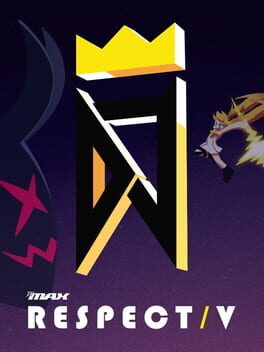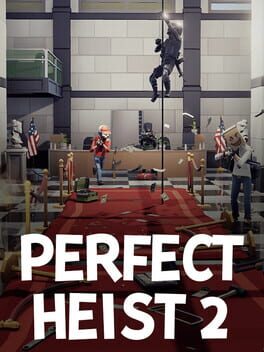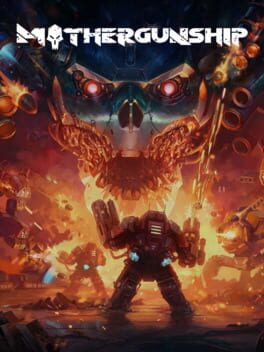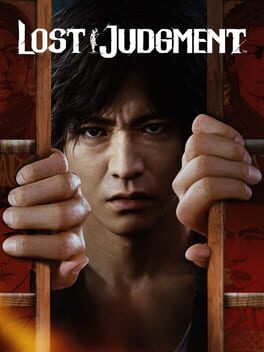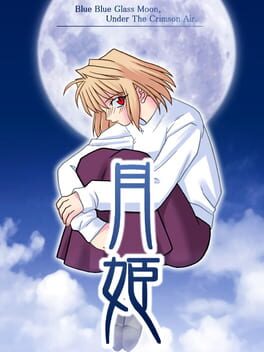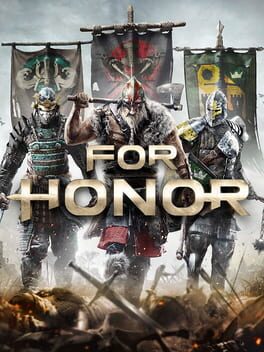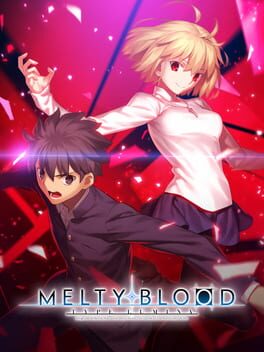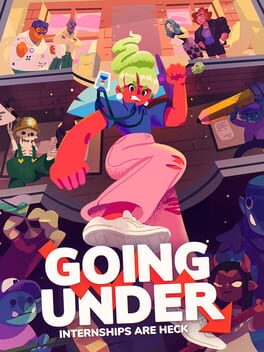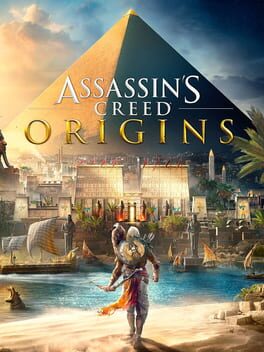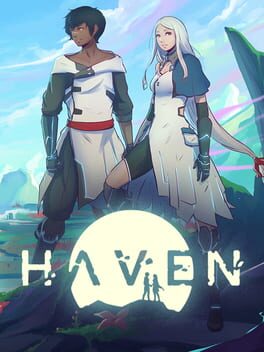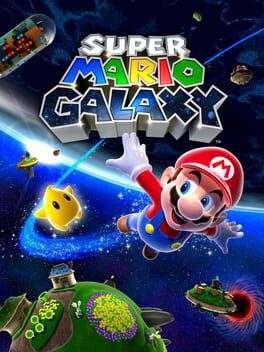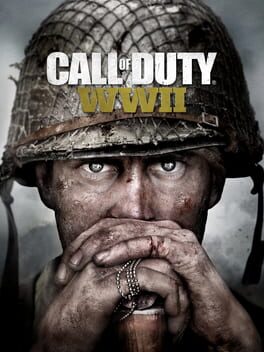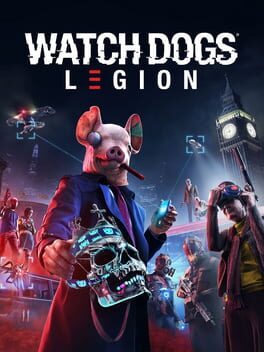jobosno
BACKER
2020
Has perfectly scratched the rhythm game itch I've had lately. Between the massive tracklist and the huge amount of difficulty customization you'll always have a good amount of songs that are in the perfect sweet spot of being fun to play while also providing a reasonable challenge.
About the tracklist here - it's decently large, it covers a fair amount of genres (some of which seem like they straight made them up), but it won't be everyone's cup of tea as techno and D&B are wildly overrepresented, and if you're not a fan of K- and J-pop either the pickings are somewhat slim. The hip-hop here ranges from uninteresting to god-awful. The best offerings in both gameplay and music here come from YUKIKA (understandably) and other rhythm games. I don't want to link the whole tracklist here but I do really want to highlight some of the most bonkers shit that's on here: their tokusatsu parodies, the worst song I've ever heard in a rhythm game, this song that sounds like every alt rock song that was on American radio in 2002, and my personal favorite - whatever this song turns into.
About moment-to-moment gameplay - the timing is fairly lenient, but you get virtually no buildup on your "Fever" meter if you're more than slightly off, it just lets you keep the combo. Notes are clear and it's fairly easy to sight-read songs, even with the music videos (which exist for every song) playing in the background. They're charted well, and it's always fairly easy to tell what sounds you're actually "playing" in the song. If it's hard to tell the difference between chords and slightly offset single notes, it's probably time to turn the note speed up a bit. The UI can be changed pretty thoroughly (and to some pretty absurd, borderline-unusable elements), and doing so makes it pretty easy to find a combo that makes the game more readable or gives it some personal flair.
Quite possibly the best rhythm game on PC at the moment - at least, the best among the games that have a fixed tracklist.
Some minor gripes:
- The music video illustrations are DeviantArt-tier, which is mostly fine, especially because you can just turn them off while you play if you really hate them.
- Why bother with volume sliders if they bottom out at 50%? At the lowest possible setting this is still the loudest game on my PC by a mile.
- I can't really tell how the "random" button on the Freestyle menu decides what difficulty to pick.
- Not really a complaint, but I thought the "missions" would be a good introduction to the game. In a sense, they are, as long as you only stick to the first, like, three missions. They ramp up in difficulty extremely quickly and are very clearly more of a challenge mode than anything.
- DLC pricing is downright punitive. I hope you don't like any of the rhythm games they've collaborated with, because if you want any songs from your favorite three-dollar rhythm game it'll cost you six times that price.
- Why can't I favorite songs in the live-play "Air" mode? I get that it lets me play songs that I don't own, but at least let me favorite the songs that I do. It doesn't show the title of the song after you play or when pausing either, so I hope you remember what it said before you started playing.
- I am so goddamn sick of hearing that League of Legends K-pop song, good god.
About the tracklist here - it's decently large, it covers a fair amount of genres (some of which seem like they straight made them up), but it won't be everyone's cup of tea as techno and D&B are wildly overrepresented, and if you're not a fan of K- and J-pop either the pickings are somewhat slim. The hip-hop here ranges from uninteresting to god-awful. The best offerings in both gameplay and music here come from YUKIKA (understandably) and other rhythm games. I don't want to link the whole tracklist here but I do really want to highlight some of the most bonkers shit that's on here: their tokusatsu parodies, the worst song I've ever heard in a rhythm game, this song that sounds like every alt rock song that was on American radio in 2002, and my personal favorite - whatever this song turns into.
About moment-to-moment gameplay - the timing is fairly lenient, but you get virtually no buildup on your "Fever" meter if you're more than slightly off, it just lets you keep the combo. Notes are clear and it's fairly easy to sight-read songs, even with the music videos (which exist for every song) playing in the background. They're charted well, and it's always fairly easy to tell what sounds you're actually "playing" in the song. If it's hard to tell the difference between chords and slightly offset single notes, it's probably time to turn the note speed up a bit. The UI can be changed pretty thoroughly (and to some pretty absurd, borderline-unusable elements), and doing so makes it pretty easy to find a combo that makes the game more readable or gives it some personal flair.
Quite possibly the best rhythm game on PC at the moment - at least, the best among the games that have a fixed tracklist.
Some minor gripes:
- The music video illustrations are DeviantArt-tier, which is mostly fine, especially because you can just turn them off while you play if you really hate them.
- Why bother with volume sliders if they bottom out at 50%? At the lowest possible setting this is still the loudest game on my PC by a mile.
- I can't really tell how the "random" button on the Freestyle menu decides what difficulty to pick.
- Not really a complaint, but I thought the "missions" would be a good introduction to the game. In a sense, they are, as long as you only stick to the first, like, three missions. They ramp up in difficulty extremely quickly and are very clearly more of a challenge mode than anything.
- DLC pricing is downright punitive. I hope you don't like any of the rhythm games they've collaborated with, because if you want any songs from your favorite three-dollar rhythm game it'll cost you six times that price.
- Why can't I favorite songs in the live-play "Air" mode? I get that it lets me play songs that I don't own, but at least let me favorite the songs that I do. It doesn't show the title of the song after you play or when pausing either, so I hope you remember what it said before you started playing.
- I am so goddamn sick of hearing that League of Legends K-pop song, good god.
At 95% positive, there is no stronger condemnation of Steam's rating system. Fairywands you owe me five dollars
2010
I wasn't against the changes Bethesda made to the Fallout IP - as much as I liked the old Fallout games, Fallout 3 more closely resembles the kind of games I normally play. Bethesda, though, has a design philosophy where their games tend to center player expression and empowerment over character expression and role-playing. This isn't necessarily wrong, but I find I get less replayability out of games centered on player expression - think Skyrim, where you can see just about everything in a single save and you're rarely locked into any of the choices you've made outside of the civil war storyline. Your actions cannot have hefty consequences because consequences could lock the player out of future quests/interactions.
FNV brings things back towards character expression - the character is more than just a way for the player to interface with game mechanics, they are meant to be a person that you assign traits to and a filter through which you see the world. It's not the pinnacle of this kind of design, but they had 18 months to make a game and they knocked it out of the park with both the quality of writing and player choice.
There are tons of quality-of-life improvements over Fallout 3 here as well, most of which I won't get into because they're not particularly mindblowing, but they do add up to a significant difference in how pleasant it is to play the game. There are things I don't like as well: I think the game would be better off without the karma system and I think the game needs more NPCs that say "fuck you, you said the wrong thing to me and I hate you, so you don't get to do my quest anymore". Both of these are nitpicky though and none of my complaints really amount to glaring issues.
This is one of those games that I would really recommend to anyone - while the shooting won't blow anyone away, it does its job and you can opt out almost entirely by using VATS if you don't want to do that bit.
FNV brings things back towards character expression - the character is more than just a way for the player to interface with game mechanics, they are meant to be a person that you assign traits to and a filter through which you see the world. It's not the pinnacle of this kind of design, but they had 18 months to make a game and they knocked it out of the park with both the quality of writing and player choice.
There are tons of quality-of-life improvements over Fallout 3 here as well, most of which I won't get into because they're not particularly mindblowing, but they do add up to a significant difference in how pleasant it is to play the game. There are things I don't like as well: I think the game would be better off without the karma system and I think the game needs more NPCs that say "fuck you, you said the wrong thing to me and I hate you, so you don't get to do my quest anymore". Both of these are nitpicky though and none of my complaints really amount to glaring issues.
This is one of those games that I would really recommend to anyone - while the shooting won't blow anyone away, it does its job and you can opt out almost entirely by using VATS if you don't want to do that bit.
2021
Surprisingly this is one of the best multiplayer stealth games I've played in a minute, in a genre that's got more than a few flops in it. Nothing quite like playing this with 2-6 friends in a continually evolving test to determine who is most inventive with the limited tools given to each of the forty classes in this game.
I can't help but feel like there's a delicate balance that's been struck here that could be destroyed in its entirety if characters continue to be added at this breakneck pace, but as things stand there's a cohesive set of mechanics where the team you're on always feels like it's stretched slightly too thin for a plan to go off perfectly. Put that way, it sounds miserable, but it's hard to capture (in text) the thrill of having it come down to a 1v1 in which a thief has trapped himself in a locked-room murder mystery, the entire round determined by the disguised thief's ability to impersonate an AI convincingly enough that the cop attacks the wrong person.
It's made all the more enjoyable if both teams are in the same Discord call, forced to type if they want to team chat. Determining which knowledge should be shared aloud and revealing your hand at the end of the round definitely adds an element to this game that enhances the whole experience, another layer of tension and an opportunity to brag about your master plan so everyone's techniques can evolve further.
I can't help but feel like there's a delicate balance that's been struck here that could be destroyed in its entirety if characters continue to be added at this breakneck pace, but as things stand there's a cohesive set of mechanics where the team you're on always feels like it's stretched slightly too thin for a plan to go off perfectly. Put that way, it sounds miserable, but it's hard to capture (in text) the thrill of having it come down to a 1v1 in which a thief has trapped himself in a locked-room murder mystery, the entire round determined by the disguised thief's ability to impersonate an AI convincingly enough that the cop attacks the wrong person.
It's made all the more enjoyable if both teams are in the same Discord call, forced to type if they want to team chat. Determining which knowledge should be shared aloud and revealing your hand at the end of the round definitely adds an element to this game that enhances the whole experience, another layer of tension and an opportunity to brag about your master plan so everyone's techniques can evolve further.
2018
I might be the only person on the planet who isn't willing to saw off 50% of their arms for more Ultrakill, but in contrast to Mothergunship I kinda understand the admiration. The gun customization is Mothergunship's flagship feature, where making your way through a level is as much about your movement as it is about your ability to create the nastiest frankengun on the planet, grafting dozens of barrels onto a monstrosity whose weight rivals that of a mid-sized battleship.
And sure, it's fun for a brief while to vomit a whole Vampire Survivors worth of bullets at your foes, but in doing so you've already discovered the game's winning strategy - more bullet, more victory. Certain projectile types might be better at dealing with certain threats, but these are not Ultrakill's tightly designed encounters, so you're highly unlikely to receive pushback that meaningfully encourages experimentation in this one. Similarly, the game's heavy usage of familiar weapon types (shotgun, gatling gun, grenade launcher) without any clever twists limits the creativity and depth of strategy the player can employ. I'm not asking for shameless rip-offs of Ultrakill's ricochet coin or punching your own shotgun pellets - although I'd welcome it - but opening up more opportunities for player interaction outside of Mouse1 + Mouse2 might single-handedly make this game into a cult classic.
And sure, it's fun for a brief while to vomit a whole Vampire Survivors worth of bullets at your foes, but in doing so you've already discovered the game's winning strategy - more bullet, more victory. Certain projectile types might be better at dealing with certain threats, but these are not Ultrakill's tightly designed encounters, so you're highly unlikely to receive pushback that meaningfully encourages experimentation in this one. Similarly, the game's heavy usage of familiar weapon types (shotgun, gatling gun, grenade launcher) without any clever twists limits the creativity and depth of strategy the player can employ. I'm not asking for shameless rip-offs of Ultrakill's ricochet coin or punching your own shotgun pellets - although I'd welcome it - but opening up more opportunities for player interaction outside of Mouse1 + Mouse2 might single-handedly make this game into a cult classic.
2021
What a gang of characters, huh? Really feel like this cast includes some of RGG's best characters standing alongside some really… curious inclusions.
Characters:
+ Higashi rocks, man. Love his grumpy ass. Truly One Of The Boys.
+ The other core characters related to the bullying plots are all quite good - Sawa-sensei is the standout, but Ehara also does a good job of playing his role. Sawa-sensei is massively important for multiple reasons but beyond that, she does so much of the early work in making Seiryo High feel like a believable setting.
+ It's very much in line with the cheesy, wholesome nonsense that RGG loves (especially in side stories!) but Class 2-2 gets some GTO-ass plot points and it's extremely my shit.
= Tsukumo and Sugiura are… fine. It makes me smile seeing that they've teamed up, but Sugiura feels like he's basically just there to fill a seat for most of this game's runtime - Yokohama 99 feels more like Tsukumo's thing than Tsukumo and Sugiura's joint venture.
- I love the character archetype Kuwana represents, but he lacks any real magnetism for me. Once his role in the main plot is revealed, there's no real mystery to this character anymore - when you know about his MO, he's a pretty easy character to read.
- Hoshino really pulls his own weight in the first game, but in Lost Judgment he mostly regresses into a bumbling dope who is there to gawk at Saori, and it makes him a grating presence when he does show up.
Detective Features:
+ Being able to use Observation Mode whenever you want makes a lot more sense than having it restricted to scripted segments, although it's mostly used just for spotting squirrel graffiti. Still, I appreciate the change.
+ Tailing is better given that you can take cover wherever you feel like you should take cover, and the persistent suspicion level makes things more challenging. "Blending in" will always be funny as hell for how conspicuous it is, but that's video games for you.
+ I don't think the main story requires you to use the drone at all? Good riddance!
= I don't mind parkour, but it's not used very much at the moment and when it is, it mostly feels like a gimmick feature. I wish it were used more in the world, and despite there being plenty of hand- and foot-holds everywhere, it's annoying having to find the one specific pipe structure Yagami likes to climb on to begin these segments.
- Stealth is BAD. Thankfully it's never too challenging since it's extremely on-rails (it even shows you where to stand and where to throw the distraction coins!) but I'm not sure why this exists at all as a gameplay system. Hell, most of the times you're using it there's not much of a point to it plot-wise, since Yagami never had much of a concern for being outnumbered before.
- I miss making friends! Kamurocho feels so much emptier when I come back, see the same faces, and have no interactions with the Smile Burger lady, or the café employee that was learning English, or homeboy teaching me about different kinds of coffee.
Combat:
+ Snake style fucks so hard. It's almost immediately satisfying to use, but by the time you've unlocked all its skills you'll be ping-ponging idiots around the room, putting them in the dirt while never taking a scratch from a weapon. Some aikido, some wing chun. We even got some shoulder strikes thrown in for good measure. Very fun!
+ Crane style really got a glow-up in Lost Judgment - using it no longer feels like you're tying a hand behind your back. Admittedly, I still barely touched it with how fun snake style is, but when you do it's even more over-the-top than it was before, and still effective at blending large mobs into pureed street goon.
+ Scrapping mortal wounds and adding mortal counters makes the game a lot easier, but also makes it less frustrating too. Where before, the easiest way to deal with Deadly Attacks was "run to the other side of the room and dick around until he's done glowing," you're now incentivized to actually interact with these attacks, or at least stay within striking distance of them.
Can you believe RGG made two entire games without someone being shot dead from off-screen?
Characters:
+ Higashi rocks, man. Love his grumpy ass. Truly One Of The Boys.
+ The other core characters related to the bullying plots are all quite good - Sawa-sensei is the standout, but Ehara also does a good job of playing his role. Sawa-sensei is massively important for multiple reasons but beyond that, she does so much of the early work in making Seiryo High feel like a believable setting.
+ It's very much in line with the cheesy, wholesome nonsense that RGG loves (especially in side stories!) but Class 2-2 gets some GTO-ass plot points and it's extremely my shit.
= Tsukumo and Sugiura are… fine. It makes me smile seeing that they've teamed up, but Sugiura feels like he's basically just there to fill a seat for most of this game's runtime - Yokohama 99 feels more like Tsukumo's thing than Tsukumo and Sugiura's joint venture.
- I love the character archetype Kuwana represents, but he lacks any real magnetism for me. Once his role in the main plot is revealed, there's no real mystery to this character anymore - when you know about his MO, he's a pretty easy character to read.
- Hoshino really pulls his own weight in the first game, but in Lost Judgment he mostly regresses into a bumbling dope who is there to gawk at Saori, and it makes him a grating presence when he does show up.
Detective Features:
+ Being able to use Observation Mode whenever you want makes a lot more sense than having it restricted to scripted segments, although it's mostly used just for spotting squirrel graffiti. Still, I appreciate the change.
+ Tailing is better given that you can take cover wherever you feel like you should take cover, and the persistent suspicion level makes things more challenging. "Blending in" will always be funny as hell for how conspicuous it is, but that's video games for you.
+ I don't think the main story requires you to use the drone at all? Good riddance!
= I don't mind parkour, but it's not used very much at the moment and when it is, it mostly feels like a gimmick feature. I wish it were used more in the world, and despite there being plenty of hand- and foot-holds everywhere, it's annoying having to find the one specific pipe structure Yagami likes to climb on to begin these segments.
- Stealth is BAD. Thankfully it's never too challenging since it's extremely on-rails (it even shows you where to stand and where to throw the distraction coins!) but I'm not sure why this exists at all as a gameplay system. Hell, most of the times you're using it there's not much of a point to it plot-wise, since Yagami never had much of a concern for being outnumbered before.
- I miss making friends! Kamurocho feels so much emptier when I come back, see the same faces, and have no interactions with the Smile Burger lady, or the café employee that was learning English, or homeboy teaching me about different kinds of coffee.
Combat:
+ Snake style fucks so hard. It's almost immediately satisfying to use, but by the time you've unlocked all its skills you'll be ping-ponging idiots around the room, putting them in the dirt while never taking a scratch from a weapon. Some aikido, some wing chun. We even got some shoulder strikes thrown in for good measure. Very fun!
+ Crane style really got a glow-up in Lost Judgment - using it no longer feels like you're tying a hand behind your back. Admittedly, I still barely touched it with how fun snake style is, but when you do it's even more over-the-top than it was before, and still effective at blending large mobs into pureed street goon.
+ Scrapping mortal wounds and adding mortal counters makes the game a lot easier, but also makes it less frustrating too. Where before, the easiest way to deal with Deadly Attacks was "run to the other side of the room and dick around until he's done glowing," you're now incentivized to actually interact with these attacks, or at least stay within striking distance of them.
Can you believe RGG made two entire games without someone being shot dead from off-screen?
2000
Given that the character select screen in Melty Blood alone is full of late-arrival spoilers, I don’t make special effort to avoid spoilers in this review. No plot events have been mentioned, but if you’re especially spoiler-sensitive you may want to avoid this. If you’ve somehow stumbled upon this page wondering if you should play this game, I do recommend it, with the caveat that there is a LOT of sexual violence in this game. It’s not a factor in every part of the story, but it’s still featured prominently in both the lore and the foreground of a few scenes.
It’s been six weeks since I finished the last route of Tsukihime at this point. I had originally contented myself with throwing down some lazy notes as I completed each route, slowly amounting to a large wall of text without many of the qualities of a real review. At this point, though, I’ve realized that I’ve not stopped thinking about this game for a month and a half - any piece of media that can do this deserves a better, more thought-out review.
The first thing I feel that I should mention is that it’s an incredibly... rough game, in a number of ways. I’ve already mentioned the sexual violence in my disclaimer at the beginning, but even with a strong stomach for this kind of thing there were a couple times where I found myself actually physically cringing at the text on my screen. The dialogue is sometimes laughably weak (god help you during the H-scenes) and the art itself can also be… strange. Nrvnqsr is an unsettling presence in the VN for his incredibly long neck long before he gets to directly participate in the story.
Despite all this, it manages to shine rather brightly through strong character writing and excellent usage of the enforced route order to execute layered reveals. It takes a lot of skill to keep new plot twists coming after 4 playthroughs and 25 hours without feeling contrived, but they do pull it off. In the early routes these tend to be delivered in the form of one of the heroines sitting down to have a thirty minute info-dump conversation with Shiki, but as the game progresses the new reveals flow better with the story and can even be rather subtle. I know it doesn't sound like I'm setting a terribly high bar here, but the late plot twists are rewarding to discover as they feel logical (by the standards of the universe) and have sufficient build-up.
Tsukihime’s characters are the real draw. There’s a reason half the reviewers here have profile photos from the game. While trope-y writing weighs some of them down pretty heavily (I’m sorry, but Akiha never progressed beyond “real doujin hours”), the saving grace here is that each character is given real agency within the story, even if they fail to make full use of it. This is why I found the Far Side routes to be much more enjoyable overall - with most of the background lore about this world out of the way and a focus on life within the Tohno mansion, there’s a lot more room to drive at what makes each of the players here special. Some of the supernatural stuff is still tiring, with SHIKI and Yumizuka becoming especially grating presences, but being able to ignore “True Ancestors” and “Dead Apostles” in favor of stories about festering resentment and familial guilt is a real blessing.
A lot of Tsukihime’s biggest flaws crop up whenever sex is involved. I maintain that it would benefit tremendously from not being an eroge, as working the H-scenes into each route has a tendency to weaken them overall. When the buildup is fine, there’s still no guarantee that the scene itself will be any good - between the music, the premise, the writing, and the fact that it was apparently deserving of a “Fridge Brilliance” entry on TV Tropes, the mere thought of the Ciel H-scene is enough to make me laugh every time. The game falls back on lust to show that Shiki “isn’t thinking clearly” and while nothing usually comes of it (even the H-scenes are typically portrayed as romantic affairs) it doesn’t stop this from being gross when it comes up. I’ve seen Kara no Kyoukai, I know what Nasu can do when he doesn't have to shoehorn in some fanservice.
Even with its flaws, Tsukihime is one of the most captivating visual novels I’ve read. It is amateurish in many ways. Its characters are both tropey and fleshed-out, its world is simultaneously cozy and unsettling. I think the best parts of the game are contained almost entirely in the back half, after you’ve already played it at least twice - and I think it’s the experience of having read through four versions of this story that makes the fifth so rewarding. While the “land of contrasts” is pretty lazy media criticism, with Tsukihime I do sincerely believe that it is because it is so frequently clumsy that the standout moments are so much more interesting.
It’s been six weeks since I finished the last route of Tsukihime at this point. I had originally contented myself with throwing down some lazy notes as I completed each route, slowly amounting to a large wall of text without many of the qualities of a real review. At this point, though, I’ve realized that I’ve not stopped thinking about this game for a month and a half - any piece of media that can do this deserves a better, more thought-out review.
The first thing I feel that I should mention is that it’s an incredibly... rough game, in a number of ways. I’ve already mentioned the sexual violence in my disclaimer at the beginning, but even with a strong stomach for this kind of thing there were a couple times where I found myself actually physically cringing at the text on my screen. The dialogue is sometimes laughably weak (god help you during the H-scenes) and the art itself can also be… strange. Nrvnqsr is an unsettling presence in the VN for his incredibly long neck long before he gets to directly participate in the story.
Despite all this, it manages to shine rather brightly through strong character writing and excellent usage of the enforced route order to execute layered reveals. It takes a lot of skill to keep new plot twists coming after 4 playthroughs and 25 hours without feeling contrived, but they do pull it off. In the early routes these tend to be delivered in the form of one of the heroines sitting down to have a thirty minute info-dump conversation with Shiki, but as the game progresses the new reveals flow better with the story and can even be rather subtle. I know it doesn't sound like I'm setting a terribly high bar here, but the late plot twists are rewarding to discover as they feel logical (by the standards of the universe) and have sufficient build-up.
Tsukihime’s characters are the real draw. There’s a reason half the reviewers here have profile photos from the game. While trope-y writing weighs some of them down pretty heavily (I’m sorry, but Akiha never progressed beyond “real doujin hours”), the saving grace here is that each character is given real agency within the story, even if they fail to make full use of it. This is why I found the Far Side routes to be much more enjoyable overall - with most of the background lore about this world out of the way and a focus on life within the Tohno mansion, there’s a lot more room to drive at what makes each of the players here special. Some of the supernatural stuff is still tiring, with SHIKI and Yumizuka becoming especially grating presences, but being able to ignore “True Ancestors” and “Dead Apostles” in favor of stories about festering resentment and familial guilt is a real blessing.
A lot of Tsukihime’s biggest flaws crop up whenever sex is involved. I maintain that it would benefit tremendously from not being an eroge, as working the H-scenes into each route has a tendency to weaken them overall. When the buildup is fine, there’s still no guarantee that the scene itself will be any good - between the music, the premise, the writing, and the fact that it was apparently deserving of a “Fridge Brilliance” entry on TV Tropes, the mere thought of the Ciel H-scene is enough to make me laugh every time. The game falls back on lust to show that Shiki “isn’t thinking clearly” and while nothing usually comes of it (even the H-scenes are typically portrayed as romantic affairs) it doesn’t stop this from being gross when it comes up. I’ve seen Kara no Kyoukai, I know what Nasu can do when he doesn't have to shoehorn in some fanservice.
Even with its flaws, Tsukihime is one of the most captivating visual novels I’ve read. It is amateurish in many ways. Its characters are both tropey and fleshed-out, its world is simultaneously cozy and unsettling. I think the best parts of the game are contained almost entirely in the back half, after you’ve already played it at least twice - and I think it’s the experience of having read through four versions of this story that makes the fifth so rewarding. While the “land of contrasts” is pretty lazy media criticism, with Tsukihime I do sincerely believe that it is because it is so frequently clumsy that the standout moments are so much more interesting.
2017
I wish so, so badly that this were a better game.
Throwaway lore justifying the type of "pirates v. ninjas" conflict that the internet of ten years ago seemed so madly in love with. A fighting game core stripped down to its basics, so that even people who don't normally engage with fighting games can enjoy it. And I do, but none of the modes here ever feel like the one that you're meant to be playing. I'll break this down in detail below, but if you want the TLDR you can skip to the end.
1v1 - The character movesets offer mixups and combos that are easy to memorize, but leave very little room for player expression - there are players who use the entire hero's kit, and players who only know how to chain together 2 or 3 moves. Very rarely will you feel like you've played someone who has used a hero in a unique way, meaning that 1v1s feel more like a training mode for the "real" game than a mode that can stand on its own. There's no glaring flaws with 1v1s, so I understand why this is one of the more popular modes, but what am I doing this for? A lot of the things that draw people to play fighting games aren't present here - continuously honing your play on a character you like, expressing yourself by developing your own playstyle, etc.
2v2 - Mostly the same problems as 1v1, except for with the wrinkle that there are now additional players to worry about. Typically, people in this game mode will pair off into 2 duels, and whoever wins their duel first has to go deal with the remaining opponent. Sure, you could gank while your duel opponent is still alive, but because they can clearly see where you spawn and every hero is roughly the same speed, they're just going to come slap you in the back of the head as soon as you get to their teammate. This feels like the right number of players for a game mode in For Honor, but with no neutral objectives or macro gameplay to worry about, there's not a lot to chew on here either.
4v4s - There are a couple iterations of 4v4, but Dominion is definitely the more popular of the two. You capture and hold 3 zones that passively grant you points, and once your team has 1000 points, respawns are disabled for the enemy team. This is definitely the closest For Honor comes to having a "core" game mode, at least in terms of how it feels. There are entire systems present in 4v4 that are unusable in smaller game modes, and the maps allow for all kinds of traps and playing around enemy sight lines, taking advantage of the fact that 4 people is just enough that your brain can't hold all of that info while you're squaring off with someone chain-spamming Orochi's light attacks. The loadout system and the objectives allow people who are weaker mechanically to contribute to the team, and it means that even heroes with more rigid movesets (warlord) can still contribute to the game by adopting a support-like playstyle (or by cheesing players into environmental hazards). The issue here is that the fighting game-like nature of the game makes the ganking and other "no honor" behaviors incredibly frustrating for everyone involved. Despite all this, this game mode is so chaotic that there's no real way to strategize unless you can recruit three friends to join you (lol good luck). Most of your time in Dominion will be spent running from capture point to capture point, trying to formulate a personal strategy that makes sense amidst the broader chaos. Time for the Revenge mechanic!
Revenge - This is one of the ways the game tries to balance things for players who get ganked. Your combat options are severely limited unless you lock onto a player, at which point a little "shield" pops up on your HUD. With rare exceptions, every attack comes from the left, right, or the top, and you defend by matching the direction. When a player ganks you, any attacks from them will always be from the side they're standing on, making it easier to defend against them, and you'll build up extra "Revenge" meter, a buff not worth describing here except for the fact that you hulk out and temporarily gain a larger health bar. Skilled players can often 1v2 with the help of this mechanic, and skilled gankers will often try to repeatedly guard-break an opponent instead of throwing out a parryable attack. What this means is that a gank from an unskilled player will often result in the victim killing both of you, frustrating both attackers. If it does work, it feels like playing a fighting game where a second enemy player suddenly connects and starts throwing out special moves in the middle of your opponent's normal combo.
Conclusion: There are some interesting ideas here, and I really like the medieval-ish fantasy aspects to this game, but the same mechanics that are intended to serve as anti-frustration measures often make this game more frustrating for everyone involved. It's a shame that Ubi didn't immediately knock it out of the park with this new IP as it's one of my favorite ideas from them in recent years, and I'm not even sure what to call it other than a "truly 3D" fighting game. If you want For Honor without playing For Honor, your closest comparison is probably Absolver (maybe?), but I never felt like Absolver's world does anything to sell a fantasy. Beyond that, I'm not aware of anything that plays like this. This is the kind of fighting game that I want, the kind of fighting game I'd like to learn, but this iteration of it definitely needs more time in the oven. I'd love to see For Honor 2 (or a shameless rip-off), but I don't know if I trust Ubisoft to take the right lessons from this game.
Throwaway lore justifying the type of "pirates v. ninjas" conflict that the internet of ten years ago seemed so madly in love with. A fighting game core stripped down to its basics, so that even people who don't normally engage with fighting games can enjoy it. And I do, but none of the modes here ever feel like the one that you're meant to be playing. I'll break this down in detail below, but if you want the TLDR you can skip to the end.
1v1 - The character movesets offer mixups and combos that are easy to memorize, but leave very little room for player expression - there are players who use the entire hero's kit, and players who only know how to chain together 2 or 3 moves. Very rarely will you feel like you've played someone who has used a hero in a unique way, meaning that 1v1s feel more like a training mode for the "real" game than a mode that can stand on its own. There's no glaring flaws with 1v1s, so I understand why this is one of the more popular modes, but what am I doing this for? A lot of the things that draw people to play fighting games aren't present here - continuously honing your play on a character you like, expressing yourself by developing your own playstyle, etc.
2v2 - Mostly the same problems as 1v1, except for with the wrinkle that there are now additional players to worry about. Typically, people in this game mode will pair off into 2 duels, and whoever wins their duel first has to go deal with the remaining opponent. Sure, you could gank while your duel opponent is still alive, but because they can clearly see where you spawn and every hero is roughly the same speed, they're just going to come slap you in the back of the head as soon as you get to their teammate. This feels like the right number of players for a game mode in For Honor, but with no neutral objectives or macro gameplay to worry about, there's not a lot to chew on here either.
4v4s - There are a couple iterations of 4v4, but Dominion is definitely the more popular of the two. You capture and hold 3 zones that passively grant you points, and once your team has 1000 points, respawns are disabled for the enemy team. This is definitely the closest For Honor comes to having a "core" game mode, at least in terms of how it feels. There are entire systems present in 4v4 that are unusable in smaller game modes, and the maps allow for all kinds of traps and playing around enemy sight lines, taking advantage of the fact that 4 people is just enough that your brain can't hold all of that info while you're squaring off with someone chain-spamming Orochi's light attacks. The loadout system and the objectives allow people who are weaker mechanically to contribute to the team, and it means that even heroes with more rigid movesets (warlord) can still contribute to the game by adopting a support-like playstyle (or by cheesing players into environmental hazards). The issue here is that the fighting game-like nature of the game makes the ganking and other "no honor" behaviors incredibly frustrating for everyone involved. Despite all this, this game mode is so chaotic that there's no real way to strategize unless you can recruit three friends to join you (lol good luck). Most of your time in Dominion will be spent running from capture point to capture point, trying to formulate a personal strategy that makes sense amidst the broader chaos. Time for the Revenge mechanic!
Revenge - This is one of the ways the game tries to balance things for players who get ganked. Your combat options are severely limited unless you lock onto a player, at which point a little "shield" pops up on your HUD. With rare exceptions, every attack comes from the left, right, or the top, and you defend by matching the direction. When a player ganks you, any attacks from them will always be from the side they're standing on, making it easier to defend against them, and you'll build up extra "Revenge" meter, a buff not worth describing here except for the fact that you hulk out and temporarily gain a larger health bar. Skilled players can often 1v2 with the help of this mechanic, and skilled gankers will often try to repeatedly guard-break an opponent instead of throwing out a parryable attack. What this means is that a gank from an unskilled player will often result in the victim killing both of you, frustrating both attackers. If it does work, it feels like playing a fighting game where a second enemy player suddenly connects and starts throwing out special moves in the middle of your opponent's normal combo.
Conclusion: There are some interesting ideas here, and I really like the medieval-ish fantasy aspects to this game, but the same mechanics that are intended to serve as anti-frustration measures often make this game more frustrating for everyone involved. It's a shame that Ubi didn't immediately knock it out of the park with this new IP as it's one of my favorite ideas from them in recent years, and I'm not even sure what to call it other than a "truly 3D" fighting game. If you want For Honor without playing For Honor, your closest comparison is probably Absolver (maybe?), but I never felt like Absolver's world does anything to sell a fantasy. Beyond that, I'm not aware of anything that plays like this. This is the kind of fighting game that I want, the kind of fighting game I'd like to learn, but this iteration of it definitely needs more time in the oven. I'd love to see For Honor 2 (or a shameless rip-off), but I don't know if I trust Ubisoft to take the right lessons from this game.
So, listen. I don't really play fighting games. I know what most of the terminology means and generally understand what the frame data people talk about means, but when I'm playing these games I am two measly notches above truly mindless button mashing. I'm never the person who excels in games due to superior mechanical skill, so I'm not particularly interested in getting deeply invested in a genre of games where I'll never feel capable of mastering anything.
But this game? This game feels good. Other reviews here seem somewhat displeased with this game's potential as a competitively viable fighting game, but this is a dream for someone who engages with fighting games on the same level as I do - a level where you "learn" a character until you feel like you can do some mildly cool shit sometimes, and your eyes glaze over when you see some 40-input combo string appear on your screen. The lightning fast pace and truly bonkers mobility options set things up so you always feel like you're a split second away from doing something flashy and just laying into this little idiot baby who thinks they can cook you. Even defense feels chunky - successfully shielding an attack feels like a lightning strike. I can't even be mad about it, I get just as hype watching them block my own attacks.
Gotta love the characters too. These are VN characters, baby, and Nasu can't stop you before each match to make you read for 45 minutes about what constitutes a "vampire" in Souya, so it's a lot of fun seeing how they've adapted the newly-HD cast to squeeze character expression out of the animations. Mostly, this work was already done with previous iterations of Melty, but it's still fun to see the way Shiki and Aoko's mentor/mentee relationship translates into moveset similarities (and the way you can show someone three seconds of gameplay from the identical red-haired maids and they would immediately understand the dynamic the two have). Not exactly reinventing the wheel in terms of characterization here but it's schlocky anime fun all the way down. Even its most serious cast members are wound so ridiculously tight that you can't help but laugh at them ("the perfect combination of human and demon blood").
It is completely brain-off fun? No, but it's as close as a mainstream fighting game will come to providing that kind of experience.
But this game? This game feels good. Other reviews here seem somewhat displeased with this game's potential as a competitively viable fighting game, but this is a dream for someone who engages with fighting games on the same level as I do - a level where you "learn" a character until you feel like you can do some mildly cool shit sometimes, and your eyes glaze over when you see some 40-input combo string appear on your screen. The lightning fast pace and truly bonkers mobility options set things up so you always feel like you're a split second away from doing something flashy and just laying into this little idiot baby who thinks they can cook you. Even defense feels chunky - successfully shielding an attack feels like a lightning strike. I can't even be mad about it, I get just as hype watching them block my own attacks.
Gotta love the characters too. These are VN characters, baby, and Nasu can't stop you before each match to make you read for 45 minutes about what constitutes a "vampire" in Souya, so it's a lot of fun seeing how they've adapted the newly-HD cast to squeeze character expression out of the animations. Mostly, this work was already done with previous iterations of Melty, but it's still fun to see the way Shiki and Aoko's mentor/mentee relationship translates into moveset similarities (and the way you can show someone three seconds of gameplay from the identical red-haired maids and they would immediately understand the dynamic the two have). Not exactly reinventing the wheel in terms of characterization here but it's schlocky anime fun all the way down. Even its most serious cast members are wound so ridiculously tight that you can't help but laugh at them ("the perfect combination of human and demon blood").
It is completely brain-off fun? No, but it's as close as a mainstream fighting game will come to providing that kind of experience.
2020
It's incredibly charming: from the very believable cast of characters, to the art style, to the interface itself, everything has that sleek, modern corporate feel. It's incredibly well-done parody and I just wish the gameplay was as good as everything else.
The abilities are interesting! The weapon variety is surprisingly large! The dungeon environments are just as fun as the hub area. It's mechanically interesting (although not very deep) and the wit and jokes from the hub area extend below too. It just really, really sucks the wind out my sails when trying to hit anything with most weapons becomes one of the Labors of Hercules. I suspect this is primarily due to the stiff way your character moves around. This control scheme is jank enough to turn the game as a whole into a chore, which is a shame given how perfectly executed everything else is. I want to know more about swomp! I want to see what happens to the Flavor guy whose passion for what he does gets ignored or exploited, depending on the day! I just don't have it in me to fight the game itself - although I guess it's kind of fitting to have the game show off a shiny, polished exterior while it wears down my will to go on.
The abilities are interesting! The weapon variety is surprisingly large! The dungeon environments are just as fun as the hub area. It's mechanically interesting (although not very deep) and the wit and jokes from the hub area extend below too. It just really, really sucks the wind out my sails when trying to hit anything with most weapons becomes one of the Labors of Hercules. I suspect this is primarily due to the stiff way your character moves around. This control scheme is jank enough to turn the game as a whole into a chore, which is a shame given how perfectly executed everything else is. I want to know more about swomp! I want to see what happens to the Flavor guy whose passion for what he does gets ignored or exploited, depending on the day! I just don't have it in me to fight the game itself - although I guess it's kind of fitting to have the game show off a shiny, polished exterior while it wears down my will to go on.
If this shift in the series is a result of Unity and Syndicate underperforming commercially, then I'm glad they failed. This shift towards an RPG format seems to have prompted Ubisoft to start investing some time into their characters as well, and it's paid off with the most interesting main character since Ezio.
Assassin's Creed has always excelled at creating incredible open worlds that make me take an interest in the history of a place I didn't previously care about. They've managed to do it again here, but Bayek carries this fucking game on his shoulders. A story beginning with a parent losing a child has a chance to fall really flat with players who can't relate, but it's written extremely well and it makes Bayek feel far more human than earlier AC protags, who feel much closer to superheroes than anything else.
The writing does a lot of the work, but Abubakar Salim puts in an excellent performance here to bring Bayek to life - it's a combination of the two that makes it believable. You understand what his values are without needing to be beaten over the head, and you can see through his interactions with children when he's reminded of his own son, without needing some hallucination or flashback to spell it out. Bayek very often feels like a man held together by ideals and duct tape and that's what sucks me in.
I know a lot of people were turned off by the shift towards RPG-lite mechanics and to be honest, they're alright here, but they're definitely half-baked in comparison to Odyssey. There are times where the difficulty between missions spikes a little too much and it feels like you're meant to level grind since these are sudden jumps, as opposed to a slow-growing gap between player level and mission level. The system of having multiple bows is a little weird and feels kinda clunky at times, and I basically just ignored one of them for about half the playthrough.
Moving away from paired animations makes the combat feel exhilarating at times, and the hitboxes match up pretty well to what's going on on-screen (I don't know how they fucked this up so bad in Valhalla after getting it right two games in a row). Aside from the sections where it feels like you're meant to level grind, the combat is generally challenging without feeling unfair and watching the Phylakes turn from a genuine roaming threat into juicy sacks of loot is a satisfying change.
All in all, Ubisoft very clearly put work into this game and the result isn't perfect, but they made some pretty dramatic changes to their flagship franchise and managed to create something worthwhile. Some of the changes that I think worked well for Origins don't work so well for later games (looting tombs was neat for Egypt and not so cool in Ancient England), but I'm really happy that Ubisoft decided to try something new when they could have just raked in the cash by shitting out another AC game that was 5% different from the last one. I think some of the things I liked most about Origins won't return to the series for a while, so I'll let the rest of you enjoy the newer games as they hone this formula - Origins is my own personal flash in the pan.
Assassin's Creed has always excelled at creating incredible open worlds that make me take an interest in the history of a place I didn't previously care about. They've managed to do it again here, but Bayek carries this fucking game on his shoulders. A story beginning with a parent losing a child has a chance to fall really flat with players who can't relate, but it's written extremely well and it makes Bayek feel far more human than earlier AC protags, who feel much closer to superheroes than anything else.
The writing does a lot of the work, but Abubakar Salim puts in an excellent performance here to bring Bayek to life - it's a combination of the two that makes it believable. You understand what his values are without needing to be beaten over the head, and you can see through his interactions with children when he's reminded of his own son, without needing some hallucination or flashback to spell it out. Bayek very often feels like a man held together by ideals and duct tape and that's what sucks me in.
I know a lot of people were turned off by the shift towards RPG-lite mechanics and to be honest, they're alright here, but they're definitely half-baked in comparison to Odyssey. There are times where the difficulty between missions spikes a little too much and it feels like you're meant to level grind since these are sudden jumps, as opposed to a slow-growing gap between player level and mission level. The system of having multiple bows is a little weird and feels kinda clunky at times, and I basically just ignored one of them for about half the playthrough.
Moving away from paired animations makes the combat feel exhilarating at times, and the hitboxes match up pretty well to what's going on on-screen (I don't know how they fucked this up so bad in Valhalla after getting it right two games in a row). Aside from the sections where it feels like you're meant to level grind, the combat is generally challenging without feeling unfair and watching the Phylakes turn from a genuine roaming threat into juicy sacks of loot is a satisfying change.
All in all, Ubisoft very clearly put work into this game and the result isn't perfect, but they made some pretty dramatic changes to their flagship franchise and managed to create something worthwhile. Some of the changes that I think worked well for Origins don't work so well for later games (looting tombs was neat for Egypt and not so cool in Ancient England), but I'm really happy that Ubisoft decided to try something new when they could have just raked in the cash by shitting out another AC game that was 5% different from the last one. I think some of the things I liked most about Origins won't return to the series for a while, so I'll let the rest of you enjoy the newer games as they hone this formula - Origins is my own personal flash in the pan.
2020
Yu and Kay are compelling characters at times, but the rest of the game doesn't really do enough to justify its inclusion. I'm not really sure why there's combat in this at all, to be honest with you, and at times it feels like it's a chore that I have to go do before I'm allowed to hear more about the characters. It's not enough to put me off from the game (not yet, anyway), but I would absolutely understand if someone else feels differently.
2007
2017
2020
The game's biggest flaw definitely comes from an underutilization of the Play As Anyone mechanic - make the characters distinct! Characters do not have meaningful shortcomings or strengths because they are either insignificant to start, or mitigated by the environment (spiderbot machines and cargo drone launch pads). Let me fail! The game is relatively easy as-is, but the fact that you aren't allowed to challenge yourself with weak characters (or a character with a strange specialization) means that the "Play As Anyone" system feels more like you're playing somewhere between 1 and 5 different characters with 50 different faces. It's a shame too, because the gameplay is decently engaging, and could be moreso if the characters you play felt different. There is a willingness to explore by adding a new mechanic, but no willingness to allow that mechanic to meaningfully impact how you play the game (or to allow the setting to change the game by maybe making guns harder to find?).
About the politics in the game: the game itself is sort of wishy-washy with its politics when it comes to things you're going to see during the course of the main story - vague allusions to "resistance," "taking things back for the people," and Bagley's jokes about "fascist school". The in-game radio shows, however, tell you the kind of weak lib shit you're meant to believe, though - that our current media landscape prizes misinformation in order to get clicks and keep you engaged, that this landscape is perfect for authoritarians to take root, but also that nothing needs to meaningfully change. It's good actually to have clickbaity news you can't trust! It teaches you to be critical (note: if you believe this, I have a bridge to sell you)! These are actual points from the game! Despite this very obvious downside to modern media that has been actually exploited in-universe to put authoritarians in power, there's nothing you can really do about the media ecosystem - you can always trust the current version of the BBC (or GBB in-game) to uh, give you fair, unbiased news that you can trust, and if authoritarians abuse this system and take over? Well, the people have to rise up of course, to restore their classic British freedoms and a capitalist democracy. If Far Cry 5 is the beer commercial version of America, this is its British equivalent.
(The audiolog I was citing can be found here: https://www.youtube.com/watch?v=FM4UfadGDkg)
About the politics in the game: the game itself is sort of wishy-washy with its politics when it comes to things you're going to see during the course of the main story - vague allusions to "resistance," "taking things back for the people," and Bagley's jokes about "fascist school". The in-game radio shows, however, tell you the kind of weak lib shit you're meant to believe, though - that our current media landscape prizes misinformation in order to get clicks and keep you engaged, that this landscape is perfect for authoritarians to take root, but also that nothing needs to meaningfully change. It's good actually to have clickbaity news you can't trust! It teaches you to be critical (note: if you believe this, I have a bridge to sell you)! These are actual points from the game! Despite this very obvious downside to modern media that has been actually exploited in-universe to put authoritarians in power, there's nothing you can really do about the media ecosystem - you can always trust the current version of the BBC (or GBB in-game) to uh, give you fair, unbiased news that you can trust, and if authoritarians abuse this system and take over? Well, the people have to rise up of course, to restore their classic British freedoms and a capitalist democracy. If Far Cry 5 is the beer commercial version of America, this is its British equivalent.
(The audiolog I was citing can be found here: https://www.youtube.com/watch?v=FM4UfadGDkg)
